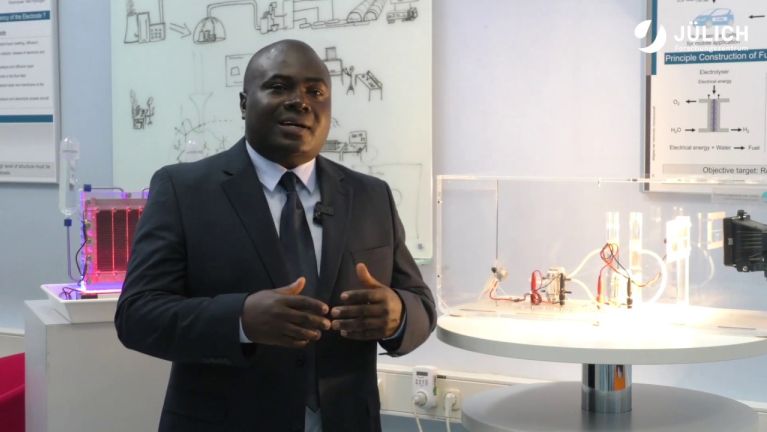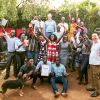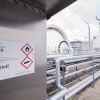"Cooperation is the key"
Physicist Solomon Nwabueze Agbo on Germany's hydrogen partnerships with countries in sub-Saharan Africa and their contribution to the energy transition.

It is seen as a beacon of hope for the energy transition: green hydrogen is produced with renewable electricity. To ensure sufficient production, the search is on for partner countries with lots of land, sun and wind. One continent with particularly high potential for 'green' energy is Africa. The Federal Ministry of Education and Research (BMBF) is therefore focusing on strategic partnerships with West and Southern Africa. It has funded the H2Atlas- Africa project with around 5.7 million euros since the summer of 2020. Solomon Nwabueze Agbo, who has a doctorate in physics and works at the Forschungszentrum Jülich GmbH is coordinating the project. In this interview, the Nigerian-born physicist talks about the most important aims of the Atlas.
Dieses YouTube-Video kann in einem neuen Tab abgespielt werden
YouTube öffnenThird party content
We use YouTube to embed content that may collect data about your activity. Please review the details and accept the service to see this content.
Open consent formDr Agbo, what did you think when you heard about the German Federal Government's National Hydrogen Strategy with Africa as a potential important partner?
After reading it in its entirety, I can say: it's extensive. It's an optimistic, but overall very clear, comprehensive roadmap with the most important, necessary building blocks for completing the energy transition. That Africa is defined, in terms of the production and export of hydrogen, as an important partner is entirely logical. International partnerships are the key to further establishing green hydrogen and countering climate change. Germany does not have sufficient renewable energy resource to generate sufficient green hydrogen necessary for the industry needs. That's why partners around the world are so important. The countries in sub-Saharan Africa are attractive because they have enough sun and wind for hydrogen production.
The H2Atlas Africa, which you are currently compiling at the Forschungszentrum Jülich looks at the potential of sub-Saharan Africa from the point of view of hydrogen partnerships with Germany. What is the aim of your project?
Until the end of 2021, we will analyse the available renewable-energy and water resources, the land that's available for the production of green hydrogen, and other relevant local socio-economic conditions in a total of 31 countries in sub-Saharan and West Africa. The Atlas has two objectives. First, it aims to record, in an interactive map, practicable locations for building an infrastructure to produce green hydrogen with potential for export to Germany . Second, the project will subsequently demonstrate through pilot projects how the production of green hydrogen, its export and distribution can be realized in an economically efficient way.
The project aims to benefit African partners too, for example by creating jobs and boosting the economies in the countries.
Why would hydrogen partnerships with Germany also be of interest to countries south of the Sahara?
That’s an important point. A partnership can only succeed if it benefits all the parties involved. We attach great importance to the fact that the African partners will also benefit from a hydrogen partnership, because, for example, it will create jobs and boost the economies in the countries. Renewable energies have been used in households for a long time in many African countries. If now, with the help of the German partners, the potential were to be further exploited and green hydrogen could also become established in Africa's industrial sector, for example, that would be an important contribution to combatting global climate change and for the economic development of African countries. Many people in Africa have great trust and confidence in technology from Germany and think the partners complement each other very well. In the end, each country in Africa must define for itself what its own priorities are for a hydrogen partnership. It is important that these are partnerships between equals.
How are you going about creating the H2Atlas Africa?
With the help of national teams, we are in a continuous exchange with all 31 participating countries and are analysing, for example, the respective energy supply and individual preferences with regard to the production and consumption of renewable energies. The political and legal frameworks for energy partnerships in the respective countries are another focus. On the African side, we have two important partners: the two centres for climate research in Ghana (West African Service Centre on Climate Change and Adapted Land Use, WASCAL) and in Namibia (Southern African Science Service Centre for Climate Change and Adaptive Land Management, SASSCAL). Together with researchers, engineers and technicians, we are identifying potential sites for plants that can generate renewable energy – for example using photovoltaics.
What are your wishes regarding the development of hydrogen partnerships?
I hope very much that people in Africa will continue to be involved in the production of green hydrogen on their continent. Because only in this way will trust, partnership and friendship endure. To this end, for example, we are setting up intensive training courses for African students and researchers. Forschungszentrum Jülich is also organizing workshops and graduate-school programmes with the WASCAL and RWTH Aachen University through the support of the BMBF. This is to support local capacity building in hydrogen technology in Africa. I am confident that our work will make an important contribution to combatting global climate change and to the sustainable future of African countries in sub-Saharan Africa as well as Germany. Of course, we are also in close contact with all the parties involved here in Germany to ensure that the interests of all partners are addressed.



